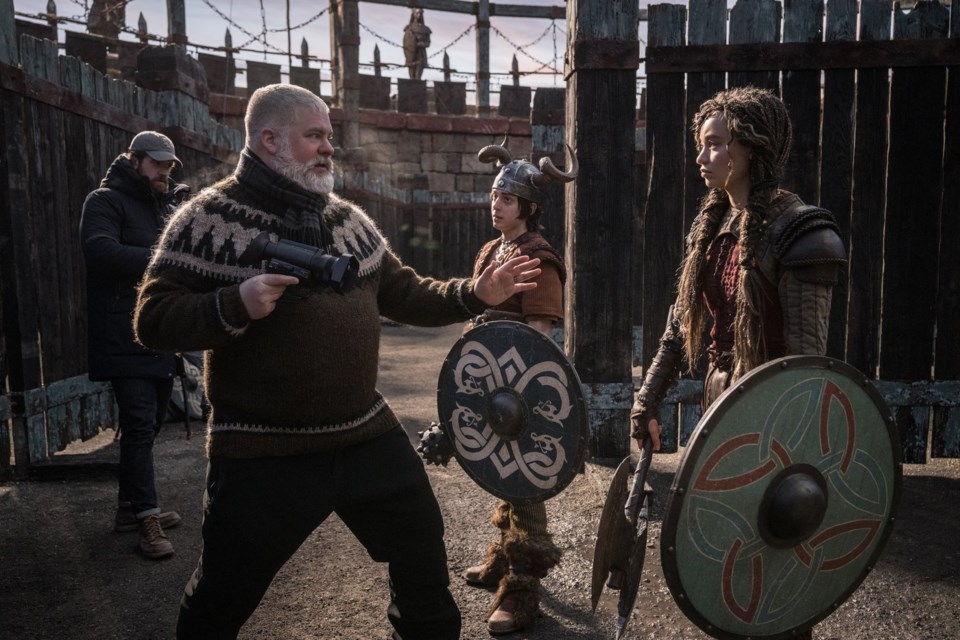TORONTO — “How to Train Your Dragon” director Dean DeBlois made it clear years ago he was no fan of Hollywood's appetite for live-action remakes of animated films.
Those words are now being thrown back at the Aylmer, Que.-raised filmmaker as he promotes his own live-action take on his 2010 Viking coming-of-age tale.
DreamWorks' original feel-good blockbuster grew into a successful trilogy and spawned TV spinoffs, short films and video games, so DeBlois understands the appeal of exploring a more grounded world in which flying dragons seem real.
DeBlois says the about-face came some three years ago when Universal Pictures president Peter Cramer first floated the idea.
"Immediately I was thinking, OK, I've already gone on record saying I hate this trend because it seems like such a missed opportunity where we could be generating new stories, new franchises and putting that money toward something that isn't just sort of, rehashing," DeBlois explains during a recent stop in Toronto.
"But I also realized in that same moment that if I don't do it, someone else is going to do it and I don't want to see somebody else's version of it. I'm too protective of the world and the characters."
The film opens Friday with a mix of practical and special effects to reimagine the fictional island of Berk and its flying reptile invaders. DeBlois says he wanted to ensure the dragons appeared photoreal, but retained the personality and endearing traits of their cartoon counterparts.
“I basically said: Consider me to write and direct it, even though I haven't made a live-action movie, because I can ensure that the heart and the spirit and the wonder of that animated movie and the whole franchise is translated faithfully in such a way that our fan base won't be disheartened," he says.
“And to their credit, they took a chance on me and we ventured forward, knowing that I would have to answer to this one day and look like a complete hypocrite.”
The “Dragon” franchise has been an intensely personal project for DeBlois, who co-wrote and co-directed the first instalment with Chris Sanders, and directed and co-wrote the second and third films.
He says he was intent on delivering a remake with “a sense of purpose” that expands and “is truly additive” to the animated version, without replacing it.
The new film stars Mason Thames (“The Black Phone”) as reluctant teen dragon slayer Hiccup, Nico Parker (“The Last of Us”) as budding teen slayer Astrid and Gerard Butler (“300”), who reprises his role as Hiccup’s warrior dad, Stoick.
DeBlois says his biggest complaint with remakes is when they hire writers and directors who had nothing to do with the original. The difference with “Dragon,” he says, is that he brings “a certain continuity from the animated movie.”
“It almost seems a bit lazy to go back in and just remake it thinking, 'Oh, we know what to do. We'll just shoot it and it'll be great.' Often cases, it loses the soul."
"How to Train Your Dragon" returns to screens just as another live-action remake dominates the box office. DeBlois co-wrote and co-directed 2002's animated alien comedy "Lilo & Stitch" with Sanders, which got a recent overhaul that has topped U.S. charts for the past three weekends and earned more than $770 million globally.
DeBlois says neither he nor Sanders were approached when that project began, although Sanders was eventually brought on to reprise his role as Stitch’s voice.
DeBlois says he can’t comment on narrative changes that have drawn some backlash because he hasn’t seen the film and wants to support the work of friends.
"I know people who worked on it, good friends of mine. I applaud their work, and I hope it does well," he says.
But he does take issue with Sanders’ limited role.
"Chris Sanders should have directed that movie because it's his brainchild,” he adds.
“Even when I worked on it, I felt like my job was to help Chris bring this alive because it was so personal to him. It's based on his sensibility. It's based on his drawing style. The fact that they overlooked Chris and went to someone else is baffling to me."
DeBlois says he embraced a re-do of “How to Train Your Dragon” as a chance to fix flaws in the original, which he recalls was made in a relative rush. That includes diving deeper into secondary characters like Astrid.
"We didn't really understand why her relationship with Hiccup was so acrimonious and in siding with him, what did she stand to lose? What were her ambitions?” he says.
“But also just simple things like: Why are these Vikings on this island in the first place? Why haven't they left? This seemed like an opportunity to kind of expand the mythology and understand how they came together as a task force representing all these different countries that were beset by dragons.”
Currently prepping for a live action remake of the film’s sequel, DeBlois says he’s similarly eager to “course correct” elements of 2014’s “How to Train Your Dragon 2,” which added Cate Blanchett to the cast.
"One of them is just that there are a lot of characters that are talking about things that happened that we, the audience, don't see," he teases, adding that he has already reached out to Blanchett on a preliminary basis, even though he’s still working on the script.
At the same time, DeBlois continues to nurse “a hopper full of ideas” that are not based on anything that's come before. He says he knows they're a tough sell when compared to well-loved and well-established properties that have proven commercial appeal.
“I understand it. I mean that is the business of Hollywood. But I'm ready when somebody's willing to kind of venture off and take a risk on an original project."
This report by The Canadian Press was first published June 11, 2025.
Cassandra Szklarski, The Canadian Press



